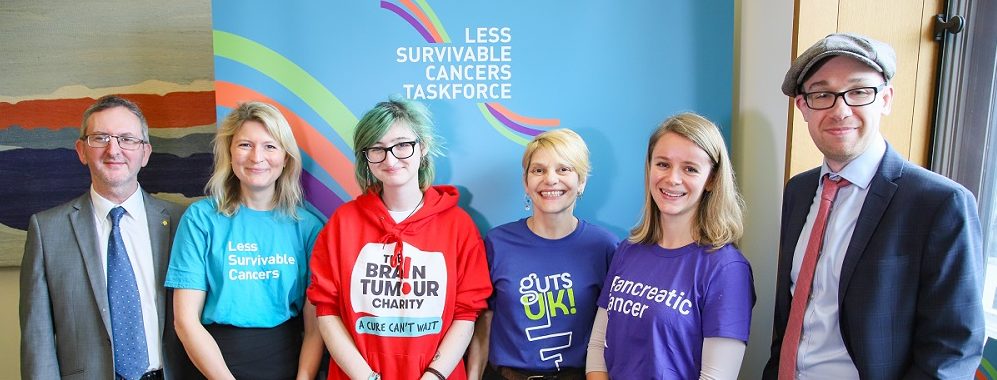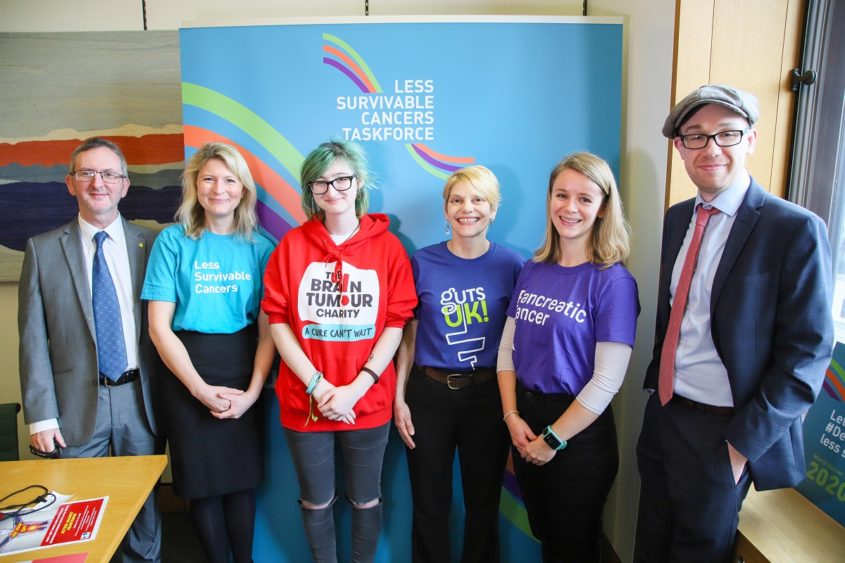

Spearheading the Less Survivable Cancers Taskforce
Pancreatic Cancer survival rates have not changed in 50 years. We knew that if we were to make the decision makers listen, we would have to make our voices louder.
Less survivable cancers have been left behind for far too long and the time from diagnosis to death for anyone who has one of these cancers is brutally short.
In 2017, we decided to bring together other charities of cancers with poor survival rates – cancers that have been ‘left behind’ for far too long. Brain, liver, lung and oesophageal and stomach cancer charities became our partners in the Less Survival Cancer Taskforce to campaign for greater prioritisation of these diseases. When 90,000 people will be diagnosed with one of these cancers in the UK each year, we believe it is a priority worth fighting for. We set an ambitious target to see survival double for these cancers by 2029 and have been making progress together on that path.


During the last 6 months, we’ve refused to let the pandemic stop us championing these cancers and have worked hard to continue the momentum. In August, we launched a new report focusing on the importance of improving early diagnosis for our cancers: ‘Detect early, diagnose fast, save lives’ Late diagnosis of cancer usually leads to poorer outcomes and less survivable cancers are far more likely to be diagnosed at a late stage than other more survivable cancers. Around one third of patients with a less survivable cancer are only diagnosed after an emergency admission to hospital.
“Our evidence of better outcomes for people diagnosed with more survivable cancers shows that it is possible to increase life expectancies, but we urgently need a whole system approach to diagnosing the less survivable cancers earlier and faster. In addition to increased public awareness of symptoms, GPs need support in terms of resources and equipment as well as access to rapid diagnostic centres for their patients. The situation is critical. The Covid-19 pandemic has put an enormous strain on our health service, but we must continue to act for people affected by these devastating diseases and give them a fighting chance. We are urging ministers, health service leaders, researchers and healthcare professionals to work with us and our patients to make the recommendations in this report a reality.”Anna Jewell, Pancreatic Cancer UK Director of Support, Influencing and Research and Chair of the Less Survivable Cancers Taskforce
The report gained significant media coverage and the Taskforce are now following up the report with Government policy teams and key parliamentarians across the UK. As a result, we have had successful meetings with the Scottish Government Team developing the Scotland Cancer Recovery Plan who have been very interested in our proposals for improving diagnosis. We have also met with the Cancer Policy Team in Northern Ireland and will be shortly discussing the report with NHS England. Diana Jupp, our Chief Executive, has also been asked to represent the Taskforce on the Cancer Recovery Taskforce being led by NHS England.
With our combined efforts, Governments are recognising the importance of ensuring that the voice of the less survivable cancers are represented in discussions about recovering and improving cancer care during the pandemic. We are also particularly delighted to see that NHS England will be launching a campaign to raise awareness of abdominal cancer symptoms starting from November.

